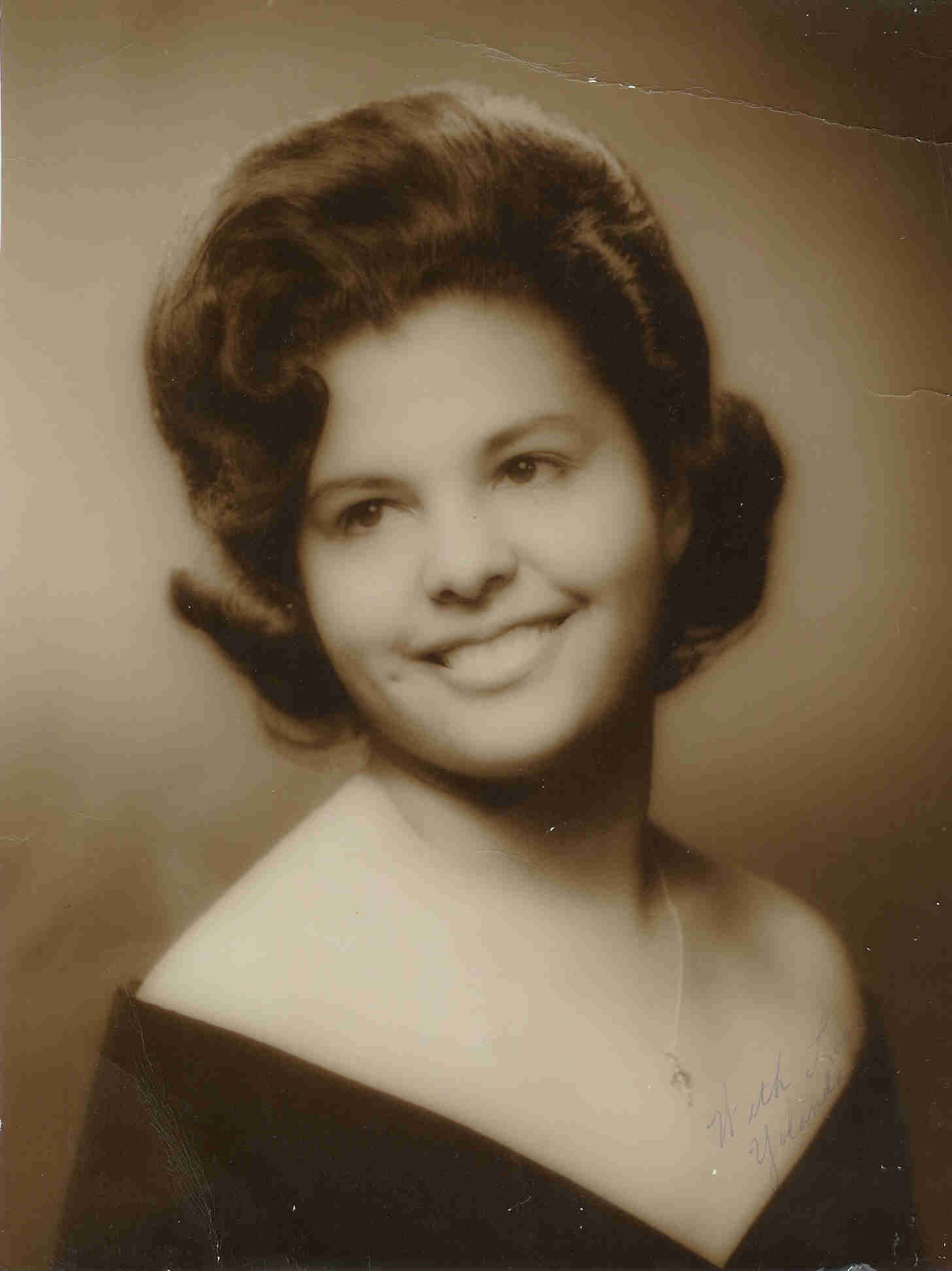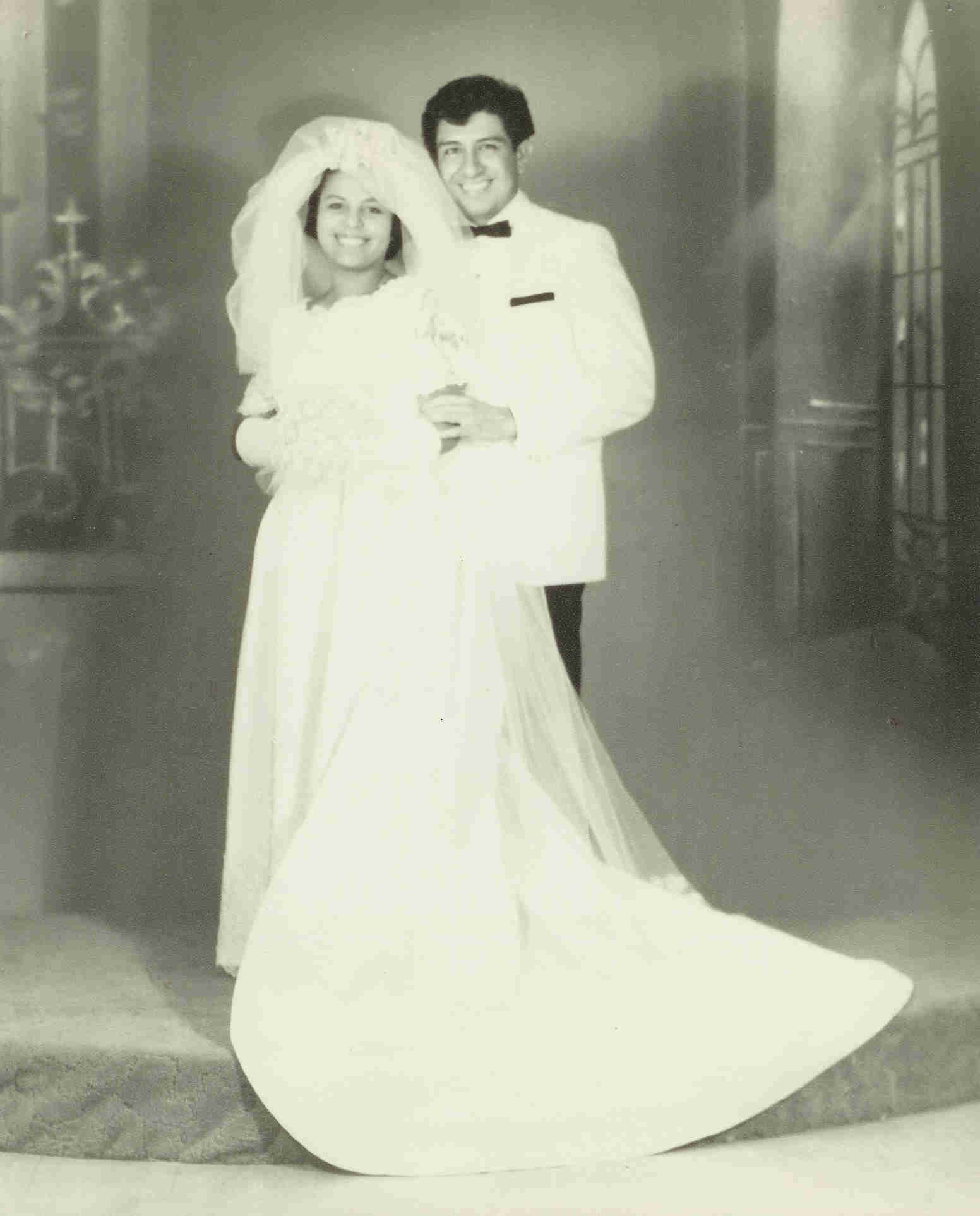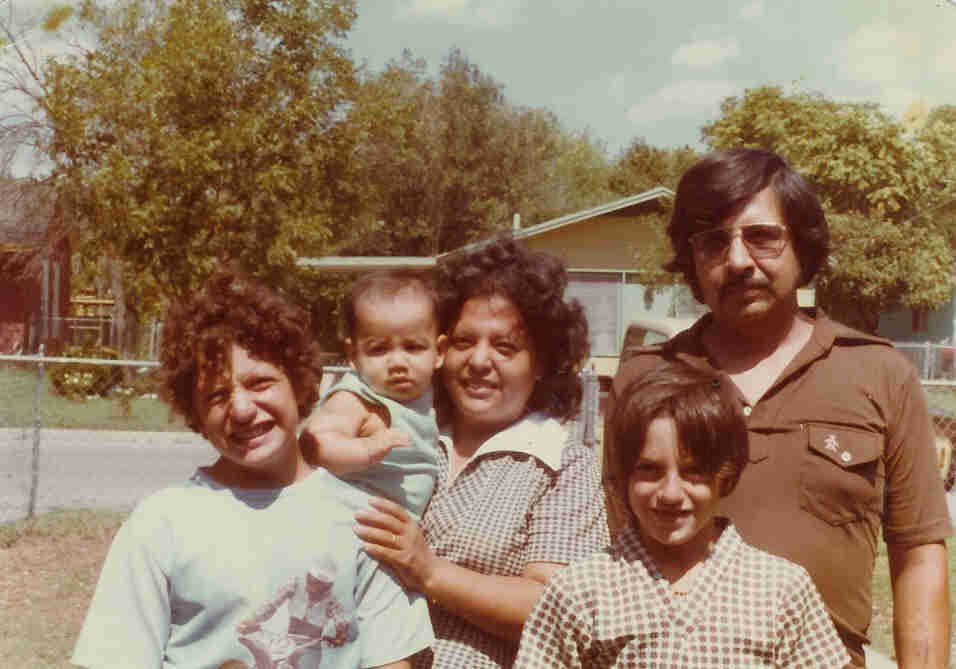Yolanda Reyes (nee Aguillon)


What was the toughest?
I guess watching over the children. Trying to keep them from getting in to trouble. Because we lived in a very small house with practically no yard to the front or the back. The lot was 25 feet wide by 50 feet long and the house was on it. The house was really small, it was just the three rooms and we had an outside bath and it had a shower, where we took baths outside. It was the kitchen, the middle room where we sleep and the front room where my parents sleep. And because it was so small there was not much we could do. There was one thing my mother never allowed us to horseplay because she was always afraid that if we started fighting that we were too many to control, so as children we never horse played.
How did the family manage with 14 people to support?
Mother made all our clothes. She was a seamstress, so she sewed everything from our underwear to our training bra. The only thing we had to buy were socks and shoes. Our cousins and aunts gave us clothing that was still in good condition. We wore a lot of hand-me-downs but there were never tattered, tore or dirty. She kept everything up pretty good. As for the food, we learned to eat things that went a long way. A lot of beans, a lot of rice, a lot of sopas (mixture of rice with very little meat). One whole chicken would feed all of us. We never went hungry. There would be times when she would get .75 cents for something she had sewed and she would send us to the store or the bakery to get two loafs of bread, which we probably paid .10 cents for a loaf. We’d get a pound of bologna, or a pound of ground meat. We had beans with every meal and potatoes in the morning. In the morning we usually had some kind of hot cereal. We weren’t much on cold cereal because with all of us one box would be gone. We weren’t allowed to drink the fresh milk because that was for the babies. She would buy a lot of Pet milk so we got our milk through the hot cereals. The surplus commodities at that time gave out a lot of cheese, butter and peanut butter. We ate meat maybe twice a week and chicken twice a week. I remember when my dad would get paid every Friday; he would stop by and pick us up hamburgers, fried chicken or tacos. Friday were looked forward to, mother would not have fix dinner. It was not as bad as it could have been. We had to do without snacks and such. We never, never went hungry.
What do you remember about the hard times?
It was hard in the winter. The house was not insulated. Not having enough warm clothing that I think was the hardest part of the winter. Sometimes our shoes would have holes in the bottom and we would have to put cardboard everyday to kind of cover the hole up. The shoes I remember being the hardest and not having a warm coat. Trying to keep all of us in shoes and warm clothes I know it was very hard for them. But they did the best they could.
Was there any discrimination against you for being Hispanic in school?
Yes, I remember specifically our senior trip. We were going to go to Landa Park in New Braunfels, which were mostly German residents. Some of us where not allowed into the park because we were Hispanic. And they didn’t so much turn us away but we could see from their reaction that we were not welcome there. That was the first time I had met up with any kind discrimination because of my race.
In high school did you participate in any organizations?
I was a member of the red jacket pep squad. I think my mother had always wanted to be one so when I wanted to join she made it possible. That was a quite a privilege for us, she was proud of the fact that I had been a red jacket.
I was also in the Secretarian Club at Tech. I participated with Mrs. Kenslow our sponsor. She worked a lot with us under privileged girls in taking us places were we’ve never been before. Through the Secretarian Club I first went to Earl Ables and we tasted the Kentucky Fried Chicken that had came out then at the time.

Well with your family, school and work what did you do for fun?
Not much. (she laughs) My mother had this that girls were taught to be homemakers because eventually we would get married and we had to learn the responsibilities of being a homemaker, which was taking care of children, cleaning house and cooking. We were in the pep squad so we got to go to the football games. We use to go to the drive-in theaters because that was about all the entertainment we could afford at a dollar a carload. As a family in the summers we would take one vacation to the coast.
At age 18, what were your life goals?
To work and get myself an education to where if I got into a bad marriage or a bad situation I could support my children and myself. I did not want to have to go through as hard of life as my mother did. She had no education and she had to put up with whatever my father handed her. At that time he was a womanizer, he go out. She just had to take care of us. The only activities she would do, she would do them through us. She learned to read, write, do math, English and spelling in helping us with our homework. She had only gone to the third grade. I had decided, since I was a little girl, I would not go through what my mother had gone through. That was my goal to finish my high school and get an education.
Was it hard for you to find your first job?
Not really because I had the secretarial training. It wasn’t hard. I never had any problem finding work from one job to another.

While you were working, did you see a difference in wages for women as compared to men?
Yes definitely. I was a secretary and clerk. When I worked with the state I worked like a statistician and different positions there. Yes definitely there was a lot of discrimination as far as the pay skills. That was just something you accepted, that’s the way it was.

As a married woman were you encouraged to say home or join the workforce?
When we got married I was working at the time. A year later we got the chance to adopt the boys, the twins. So at that time my husband talked to me. He says, “Look I’d like for you to say home and take care of the children, so if you take care of what I make you can stay at home and not have to work anymore”. The decision was mutual.

What historical event affected you life the greatest?
During the time
President Kennedy was killed my husband was in Germany then. There was fear; I can’t say there wasn’t fear. We just didn’t know who had done it or the motive or whether if it would start another world war. So until facts came out who had done it and why, yes I can say it brought fear into our lives.
Were any of your brothers in the Korean War?
No my brothers served in the services but none of them ever went to war. My uncles have been in the Korean War. I had seen the effects it had left on them three of them. That was a hard war. We had all grown up together and to see my uncles scream in the middle of the night, see things and hallucinate because of what they had gone through in the Korean War. That was really sad for us.
What do you feel has been your greatest achievement in you life?
That both of us coming from families that were very low income, I mean we were down what you would call poverty level and uneducated parents on both sides. That together my husband and I have been able to achieve as much materially as we have. We were able to raise the children and give them an education until they decided they didn’t want any more education. And to give them the means to make a better life for themselves. We were able to give our children a lot more material things than we had. I was proud of the fact that we had been able to do so much for them. And today our grandchildren are able to a lot more than even our children did.
Who or what has been your life’s inspiration?
Because our parents, both his and mine, they were so poor yet they manage to accomplish to better themselves. We saw with effort and careful planning we would be able to do it. We made sure God came first, he has provided our children and our home.
How have you seen the women’s role change?
Like I said my mother had to slave over the sewing machine because she could not get out and work because of so many children. She didn’t have the opportunity to get out and work because of no education. She would have to be in a sweatshop that was the only job available. Yet with us, we were six sisters, each one of us got our education. Each one of us were able to go to work where we could advance and not have to go to sweatshops. I can see woman now in places where they really have authority.
If you could change something in your life, what would you change?
I have no regrets. Till now I have nothing to say that I wish I’ve done this or I wish I’ve done that. It’s been good.
Do you have any advice for women?
If women would stop sometimes and think that you do owe to your husband. I mean if he works and he is the sole supporter of the family you owe him the respect that he’s due. Not to be stepped on not to be considered a piece of property. Stand up for what you believe is right. Work together as a family.

City of New Branfels"Landa Park"PARD Parks and recreation Department Copyright 2003 http://www.ci.new-braunfels.tx.us/parks/Landa%20Park.htm (November 29, 2004) This website explains the rules and regulations for the park. The park charges for all picnic tables if you live outside of New Braunfels.